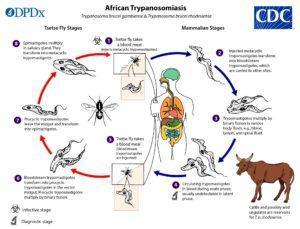
Life cycle image and information courtesy of DPDx (CDC’s Division of Parasitic Diseases and Malaria (DPDM))
Trypanosomiasis endemic to Sub-Saharan Africa, affects both humans and livestock. In spite of the low disease burden, Trypanosomiasis poses a serious threat to the agricultural economy. Treatment of the disease has severe side effects and currently no vaccine exists. Production of IFN-γ and TNF-α has been associated with early protection against infection. One of the major producers of these cytokines are natural killer (NK) cells. Onyilagha et al., aimed to determine if NK cells play an important role during acute Trypanosomiasis.
Onyilagha et al., showed that following murine T. congolense infection, the proportion of NK cells, as well as the proportion of IFN-γ and TNF-α producing cells increased. Using NK cell deficient mice, they showed that absence of NK cells was associated with uncontrolled parasitemia and death within 15 days of infection compared to wild type. Interestingly, NK cell deficiency was associated with low levels of both T cell and CD3- lymphocyte production of IFN-γ and TNF-α, but did not affect generation Trypanosoma-specific antibodies. Adoptive transfer of functional NK cells to NK cell deficient mice, greatly improved survival and restored production of IFN-γ and TNF-α. Finally, they mechanistically demonstrated that perforin dependent cytotoxic activity and not IFN-γ and TNF-α production by NK cell is responsible for protective immunity mediated by NK cells during murine T. congolense infection.
In summary, Onyilagha et al., showed that cytotoxic NK cells play an important role in mediating protection during murine T. congolense infection and critical for the control of parasitemia. These results highlight the potential of targeted NK in improving Trypanosomiasis therapy.
Journal Article: Onyilagha et al.,2019. NK Cells Are Critical for Optimal Immunity to Experimental Trypanosoma congolense Infection. Journal of Immunology










